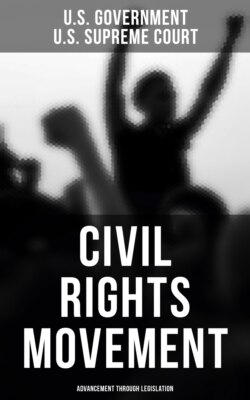Читать книгу Civil Rights Movement - Advancement Through Legislation - U.S. Government - Страница 14
На сайте Литреса книга снята с продажи.
SECTION III
ОглавлениеTable of Contents
And be it further enacted, That the district courts of the United States, within their respective districts, shall have, exclusively of the courts of the several States, cognizance of all crimes and offences committed against the provisions of this act, and also, concurrently with the circuit courts of the United States, of all causes, civil and criminal, affecting persons who are denied or cannot enforce in the courts or judicial tribunals of the State or locality where they may be any of the rights secured to them by the first section of this act; and if any suit or prosecution, civil or criminal, has been or shall be commenced in any State court, against any such person, for any cause whatsoever, or against any officer, civil or military, or other person, for any arrest or imprisonment, trespasses, or wrongs done or committed by virtue or under color of authority derived from this act or the act establishing a Bureau for the relief of Freedmen and Refugees, and all acts amendatory thereof, or for refusing to do any act upon the ground that it would be inconsistent with this act, such defendant shall have the right to remove such cause for trial to the proper district or circuit court in the manner prescribed by the "Act relating to habeas corpus and regulation judicial proceedings in certain cases," approved March three, eighteen hundred and sixty-three, and all acts amendatory thereof. The jurisdiction in civil and criminal matters hereby conferred on the district and circuit courts of the United States shall be exercised and enforced in conformity with the laws of the United States, so far as such laws are suitable to carry the same into effect; but in all cases where such laws are not adapted to the object, or are deficient in the provisions necessary to furnish suitable remedies and punish offences against law, the common law, as modified and changed by the constitution and statutes of the State wherein the court having jurisdiction of the cause, civil or criminal, is held, so far as the same is not inconsistent with the Constitution and laws of the United States, shall be extended to and govern said courts in the trial and disposition of such cause, and, if of a criminal nature, in the infliction of punishment on the party found guilty.
